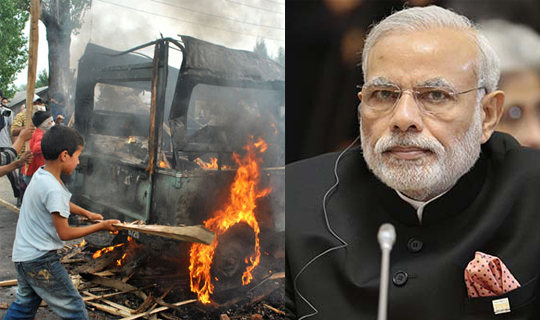Sep 26: Escalating tension over Kashmir region is presenting a challenge to Prime Minister Narendra Modi who needs regional peace to reach his principal goal of economic revival in the country. But Indian citizens have been clamouring for a response to what they say is a provocation by Pakistan.

The tension reached a boiling point on the early morning of Sept 18 when militants attacked an army base near the town of Uri in Kashmir and killed 18 soldiers setting off a war of words between the two nuclear powers, which have fought three wars in recent decades. India accuses the militants of having links to Pakistan.
The situation not only risks economic growth but could also send two nations skidding into a nuclear war. “It could happen, and it would be catastrophic for both countries,” said Stephen P Cohen, the author of “Shooting for a Century: The India-Pakistan Conundrum.”
India and Pakistan have been locked in a feud — it began nearly 70 years began ago with their independence from Britain — mainly over the Himalayan valley of Kashmir.
The dispute over its control, which has led to two wars, had appeared to be relatively
dormant since 2010 as tourists returned to the scenic region and turnouts in elections were large.
That led the Indian government to believe that the turbulence of recent decades might be over, says Omar Abdullah, former chief minister of Jammu and Kashmir.
That thinking, it now appears, was a mistake. There were warning signs over the last two years about rising unrest among young people in Kashmir. Small disputes with the Indian security forces stationed in the Kashmir Valley often drew enormous crowds very quickly. The killing of a 22-year-old separatist militant named Burhan Muzaffar Wani by Indian security officers in July touched off the latest protests.
“Wani should have served as an alarm bell for the government system,” said Siddharth Varadarajan, a former editor-in-chief of the English daily The Hindu. “Why would a young man, instead of taking up engineering, adopt a course that any reasonable person would tell him would end up in death?”
Now, Kashmir is engulfed in a crisis. Since the shooting, the Valley has been shut down, with curfews and strikes forcing the closing of schools, offices and markets. Wani’s death incited violent stone-throwing protests that the security forces sought to eradicate by firing birdshot at protesters.
The use of the birdshot, or tiny pellets that scatter when fired, has caused thousands to be wounded, many with eye injuries. More than 70 people, including protesters and Indian security forces, have been killed since the violence began.
The question now is whether Modi can defuse the crisis. “Modi has the political capacity to do it,” said Ashley J Tellis, a senior associate with the Carnegie Endowment for International Peace.
Tellis said Modi had two advantages: His Bharatiya Janata Party controls the Lower House of Parliament, so he has the legitimacy to make a bold move; and his party’s strong Hindu nationalist roots allow him to take more risks without being accused of pandering to Muslims, who make up the majority in Jammu and Kashmir.
But those same roots make it hard for Modi to enact a policy in Kashmir that will draw the young protesters into a dialogue. “That must involve a conversation about the restoration of autonomy in Kashmir in a way originally imagined under the 1954 agreement,” Tellis said. He was referring to a deal struck by India’s first prime minister, Jawaharlal Nehru, that gave Jammu and Kashmir substantial political autonomy within India. That agreement has gradually eroded.
“I personally think any attempt simply to treat Kashmir as just another Indian state is not going to work,” Tellis said. Because Modi began his political career in the Rashtriya Swayamsevak Sangh, a right-wing Hindu organisation known as the RSS, that strongly influences his party and has opposed more autonomy for Kashmir, Tellis and others said it would be extremely difficult for the prime minister to offer such a bold policy in Kashmir.
“The RSS has the capacity for constraining even the prime minister on this question,” Tellis said. Even if Modi is bold enough to try, he will need to regain control of the streets of southern Kashmir first and find a leader to engage in conversation. So far, the Indian government has been unable to find anyone with whom to negotiate.
Freelance diplomacy
People close to the government, nevertheless, have been trying their hand at freelance diplomacy, including the guru Sri Sri Ravi Shankar. He invited the father of Wani to his ashram and suggested that the elder Wani might serve as an intermediary.
“Sri Ravi Shankar expected that I can play some role in bringing peace to Kashmir,” the father, Mohammad Muzafar Wani, said in an interview. “He said, ‘To resolve the problem, with whom should the talks be initiated? With you?’ I told him, ‘No.'”
For Modi, pressure remains strong to punish Pakistan with some form of military action for the attack on the army base. Pakistan has talked tough.
In a news release, Gen Raheel Sharif, the Pakistani Army Chief, said that “taking note of a hostile narrative” from India, the armed forces of Pakistan were “fully prepared to respond to the entire spectrum of direct and indirect threat.”
Speaking before the United Nations General Assembly in New York on Wednesday, Prime Minister Nawaz Sharif of Pakistan said peace between his country and India “cannot be achieved without a resolution to the Kashmir dispute.”
There was another flare-up of violence along the Kashmir border on Tuesday with Pakistan when Indian troops battled two groups of militants trying to cross from the Pakistani side into India, the Ministry of Defence said in a statement. One Indian soldier was killed in the skirmishes.







Comments
Add new comment